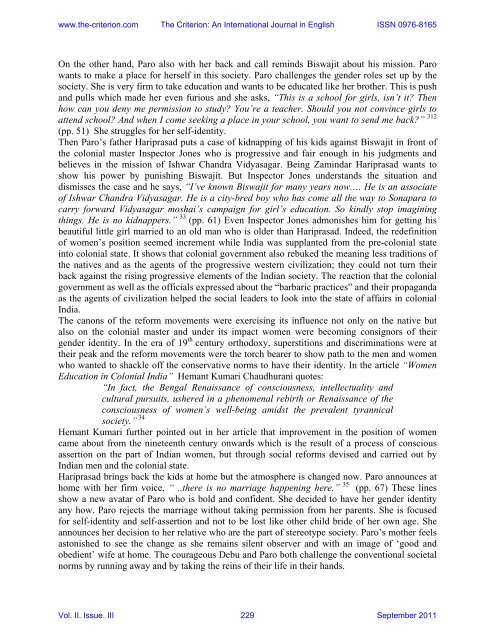Vol. II. Issue. III September 2011 - The Criterion: An International ...
Vol. II. Issue. III September 2011 - The Criterion: An International ...
Vol. II. Issue. III September 2011 - The Criterion: An International ...
You also want an ePaper? Increase the reach of your titles
YUMPU automatically turns print PDFs into web optimized ePapers that Google loves.
www.the-criterion.com <strong>The</strong> <strong>Criterion</strong>: <strong>An</strong> <strong>International</strong> Journal in English ISSN 0976-8165<br />
On the other hand, Paro also with her back and call reminds Biswajit about his mission. Paro<br />
wants to make a place for herself in this society. Paro challenges the gender roles set up by the<br />
society. She is very firm to take education and wants to be educated like her brother. This is push<br />
and pulls which made her even furious and she asks, “This is a school for girls, isn’t it? <strong>The</strong>n<br />
how can you deny me permission to study? You’re a teacher. Should you not convince girls to<br />
attend school? <strong>An</strong>d when I come seeking a place in your school, you want to send me back?” 312<br />
(pp. 51) She struggles for her self-identity.<br />
<strong>The</strong>n Paro’s father Hariprasad puts a case of kidnapping of his kids against Biswajit in front of<br />
the colonial master Inspector Jones who is progressive and fair enough in his judgments and<br />
believes in the mission of Ishwar Chandra Vidyasagar. Being Zamindar Hariprasad wants to<br />
show his power by punishing Biswajit. But Inspector Jones understands the situation and<br />
dismisses the case and he says, “I’ve known Biswajit for many years now…. He is an associate<br />
of Ishwar Chandra Vidyasagar. He is a city-bred boy who has come all the way to Sonapara to<br />
carry forward Vidyasagar moshai’s campaign for girl’s education. So kindly stop imagining<br />
things. He is no kidnappers.” 33 (pp. 61) Even Inspector Jones admonishes him for getting his<br />
beautiful little girl married to an old man who is older than Hariprasad. Indeed, the redefinition<br />
of women’s position seemed increment while India was supplanted from the pre-colonial state<br />
into colonial state. It shows that colonial government also rebuked the meaning less traditions of<br />
the natives and as the agents of the progressive western civilization; they could not turn their<br />
back against the rising progressive elements of the Indian society. <strong>The</strong> reaction that the colonial<br />
government as well as the officials expressed about the “barbaric practices” and their propaganda<br />
as the agents of civilization helped the social leaders to look into the state of affairs in colonial<br />
India.<br />
<strong>The</strong> canons of the reform movements were exercising its influence not only on the native but<br />
also on the colonial master and under its impact women were becoming consignors of their<br />
gender identity. In the era of 19 th century orthodoxy, superstitions and discriminations were at<br />
their peak and the reform movements were the torch bearer to show path to the men and women<br />
who wanted to shackle off the conservative norms to have their identity. In the article “Women<br />
Education in Colonial India” Hemant Kumari Chaudhurani quotes:<br />
“In fact, the Bengal Renaissance of consciousness, intellectuality and<br />
cultural pursuits, ushered in a phenomenal rebirth or Renaissance of the<br />
consciousness of women’s well-being amidst the prevalent tyrannical<br />
society.” 34<br />
Hemant Kumari further pointed out in her article that improvement in the position of women<br />
came about from the nineteenth century onwards which is the result of a process of conscious<br />
assertion on the part of Indian women, but through social reforms devised and carried out by<br />
Indian men and the colonial state.<br />
Hariprasad brings back the kids at home but the atmosphere is changed now. Paro announces at<br />
home with her firm voice, “ ..there is no marriage happening here.” 35 (pp. 67) <strong>The</strong>se lines<br />
show a new avatar of Paro who is bold and confident. She decided to have her gender identity<br />
any how. Paro rejects the marriage without taking permission from her parents. She is focused<br />
for self-identity and self-assertion and not to be lost like other child bride of her own age. She<br />
announces her decision to her relative who are the part of stereotype society. Paro’s mother feels<br />
astonished to see the change as she remains silent observer and with an image of ‘good and<br />
obedient’ wife at home. <strong>The</strong> courageous Debu and Paro both challenge the conventional societal<br />
norms by running away and by taking the reins of their life in their hands.<br />
<strong>Vol</strong>. <strong>II</strong>. <strong>Issue</strong>. <strong>II</strong>I 229 <strong>September</strong> <strong>2011</strong>
















